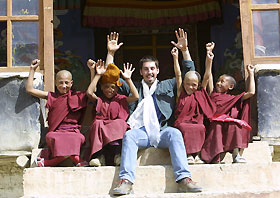For more archives, go to the Advance Archive/Search Page.
Student Savors Summer Experiences With Tibetan Monks
It's 6 a.m. as Chris Kakowski slips out of his sleeping bag. Nearby, Rinpoche and Sonom sit cross-legged on the floor of the small apartment adjusting their robes. They're almost ready to pray.
 |
Christian Kakowski with four young monks at Thongle Gompa Monastery in northern India, where he spent part of the summer assisting in the making of a documentary film.
|
Rinpoche and Sonom are two of nine Tibetan Buddhist monks from the Drepung Loseling monastery in India who are on a U.S. tour. Kakowski, a UConn student, is their driver.
When Kakowski, a senior majoring in English and philosophy, heard that the group of Tibetan Buddhist monks needed someone to drive their tour van in California, he jumped at the chance. The monks make annual tours to increase awareness about Tibet and to raise funds for their monastery.
"I told them I could do it for about a month," he says. "I thought the experience would mesh with my summer research plans to work on a documentary film about Buddhists in India."
Kakowski, who is in the Honors Program, is one of 42 students who continued their studies during the summer break through UConn's Summer Undergraduate Research Fund. Administered through the Undergraduate Research Office, the fund makes finances available to full-time undergraduates who have arranged a research project with a full-time faculty member. Kakowski worked with John Gatta, professor of English.
Kakowski kept a journal during the summer and will write a paper on his experiences this semester. He will compare the philosophical roots of Ralph Waldo Emerson and his connection to Eastern religion.
Kakowski is not a stranger to the Buddhist culture: his stepfather practices the religion; and, when he was in high school, his family hosted Tibetan monks during their annual tours of the United States. He also started the UConn chapter of Students for a Free Tibet.
"The monks are amazing people," says Kakowski, who navigated the California freeways with the group, zigzagging from San Francisco to San Jose, San Diego, and Arizona. "What strikes me most is their compassion and approach to life. They have the ability to connect with anyone, anywhere, at any time."
The monks visited about 100 households in Vietnamese communities, where they offered prayers and chatted with families. They visited three or four households a day, and stayed with a different family every night.
Later in the summer, Kakowski headed to Zanskar, a remote region in the north of India. There he spent three weeks working on a documentary about the preservation of Zanskari culture.
"The Zanskaris were chosen because they're among the last survivors of Tibetan culture," he notes. "They've lived secluded lives for thousands of years surrounded by the Himalayas, but now their culture is being threatened by the West."
Kakowski says roads are being built from urban areas to local villages, and there are even some video stores.
"Friends of Zanskar," a nonprofit organization that Kakowski's stepfather helped found, arranged for the film to be made. It was directed by Frederic Marx, best known for his work on the documentary Hoop Dreams. Kakowski handled the sound for the project. "I got a crash course in documentary filmmaking," he says.

